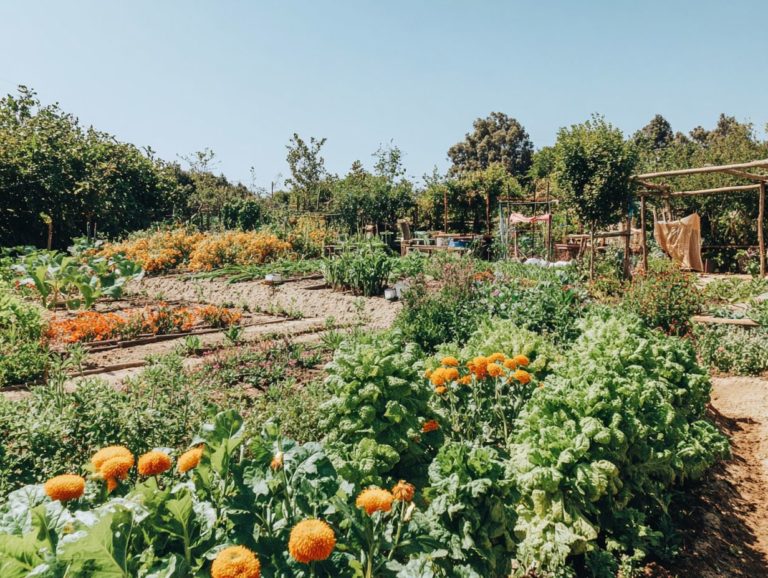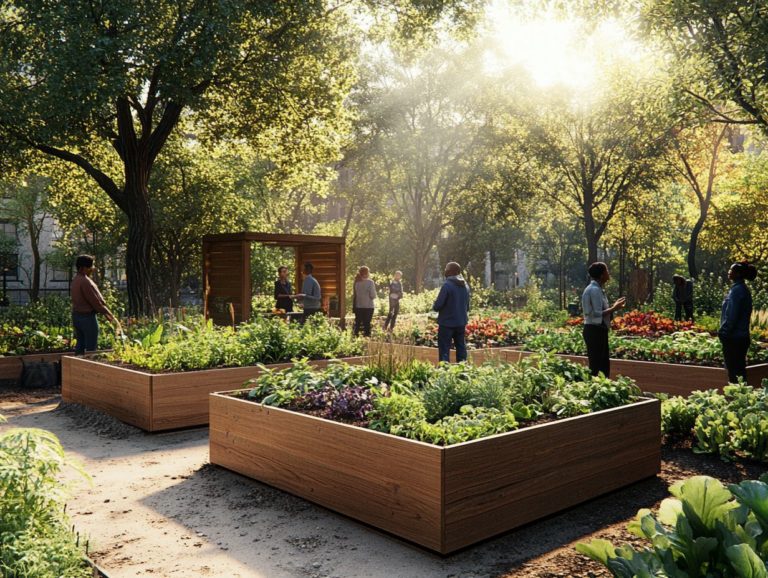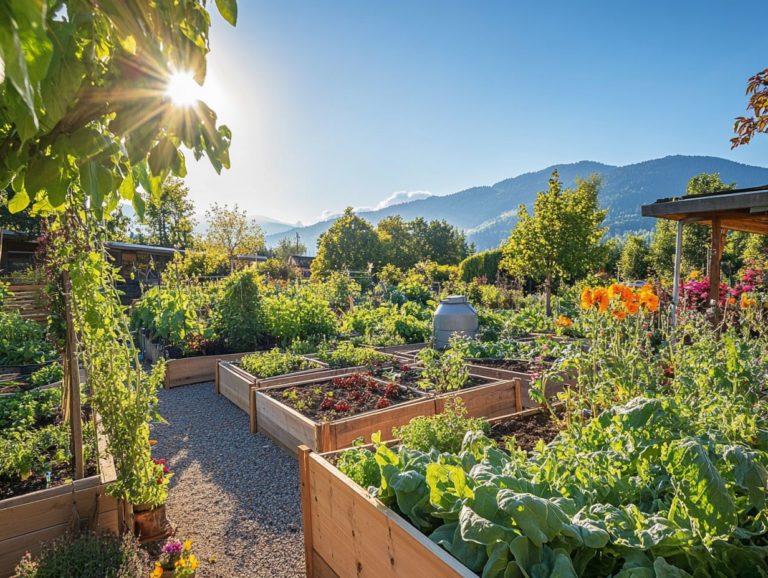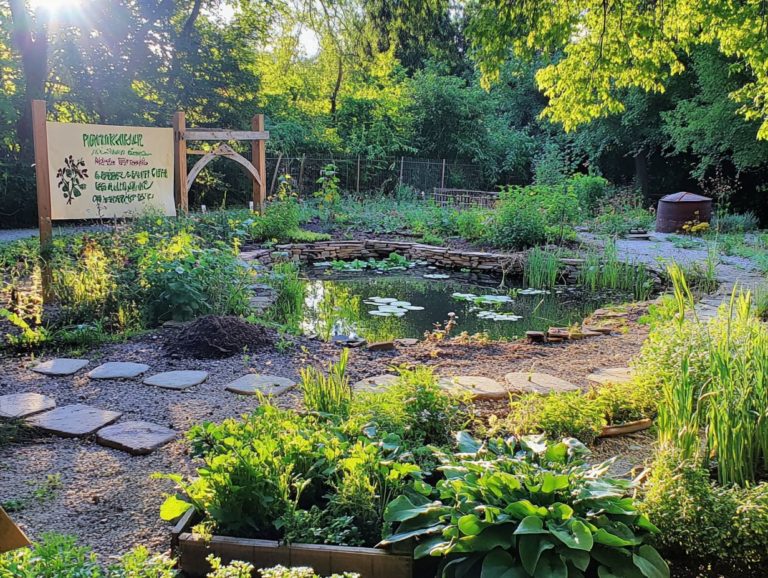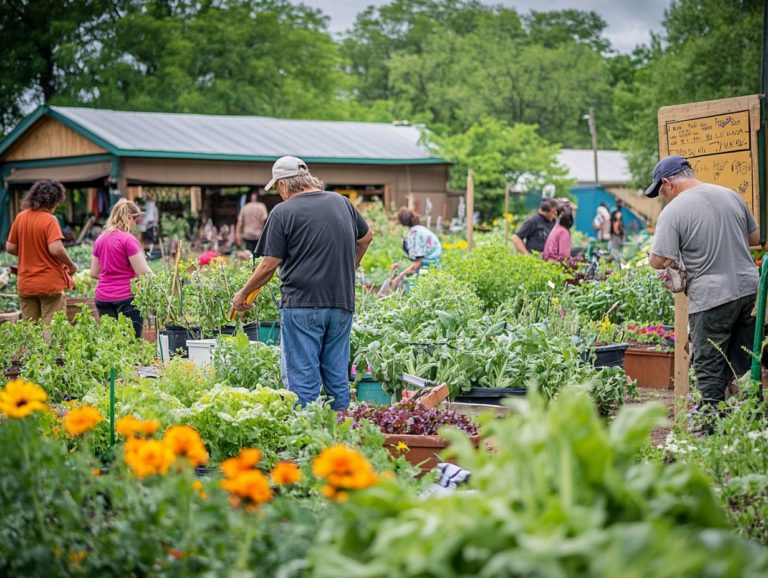What Are the Principles of Ecological Gardening?
Ecological gardening transcends mere trendiness; it embodies a sustainable approach that aligns your garden with the rhythms of the natural world.
In this article, you will delve into the essentials of ecological gardening. You will uncover its definition, environmental benefits, and the foundational principles that underpin this enriching practice.
You ll explore practical steps to incorporate ecological techniques into your gardening routine and the tools you ll need. Additionally, you will dispel common misconceptions that may hinder your progress.
Now is the perfect time to transform your gardening habits and help the planet!
Contents
- Key Takeaways:
- The Benefits for the Environment
- Defining Ecological Gardening
- Principles of Ecological Gardening
- How to Implement Ecological Gardening
- Common Myths and Misconceptions
- Frequently Asked Questions
- What are the principles of ecological gardening?
- Why is using native plants important in ecological gardening?
- How does ecological gardening promote biodiversity?
- What are some ways to conserve water in environmentally friendly gardening?
- Why is minimizing chemical use important in environmentally friendly gardening?
- How does environmentally friendly gardening contribute to a healthy ecosystem?
Key Takeaways:
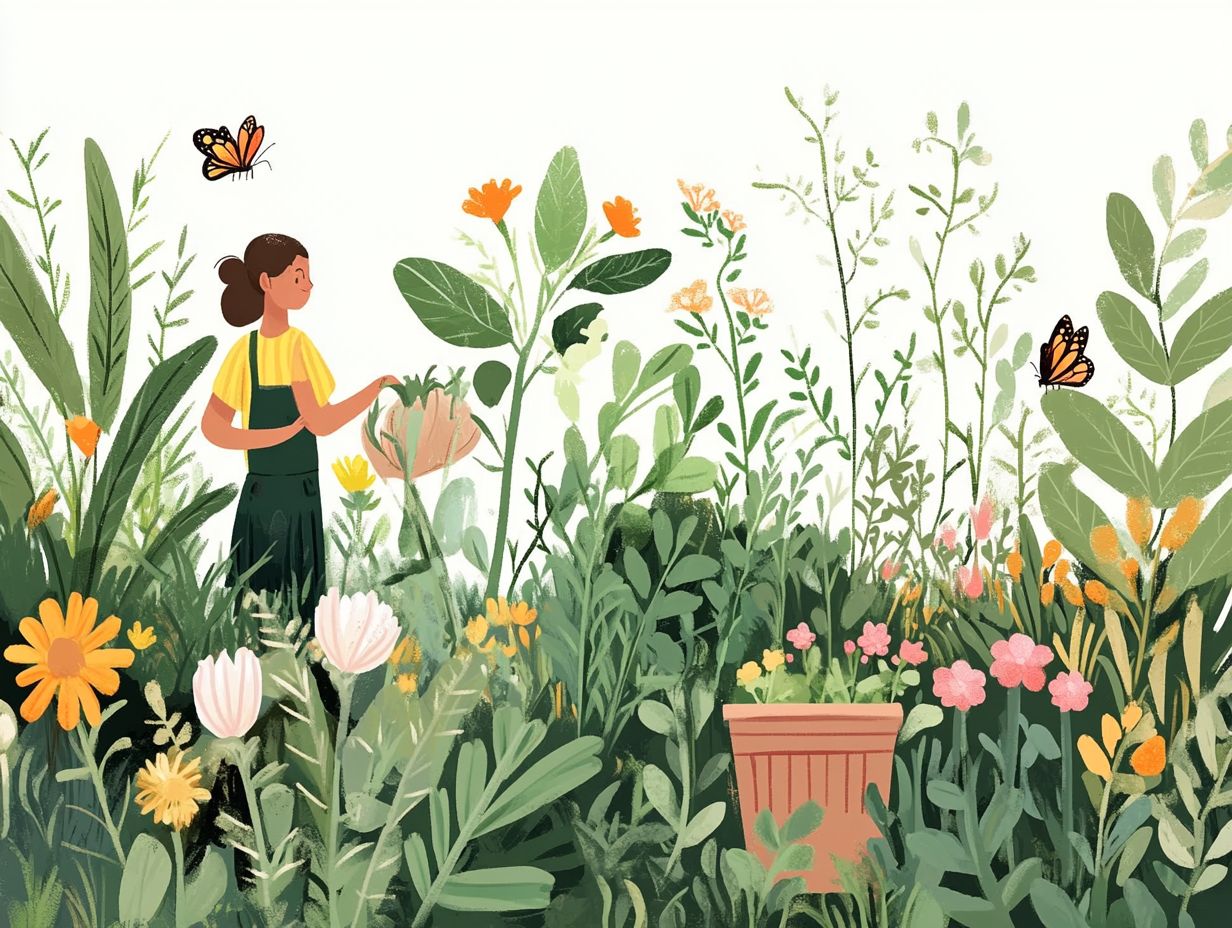
- Ecological gardening is about working with nature, not against it. This means using sustainable practices and creating biodiverse gardens to benefit the environment.
- To implement ecological gardening, start by understanding and defining it. Then follow steps and use proper tools and techniques for success.
- There are common myths and misconceptions about ecological gardening, but these can be debunked by understanding the true principles and benefits of this gardening approach.
The Benefits for the Environment
Ecological gardening presents a wealth of benefits for the environment. It enriches biodiversity and supports vital wildlife, including pollinators and beneficial insects.
By utilizing composting techniques, you create nutrient-dense soil and enhance its structure and health. This leads to improved moisture retention and reduced erosion. Such practices, along with prioritizing organic materials, play a significant role in carbon sequestration. The Intergovernmental Panel on Climate Change emphasizes that healthy soils excel at storing carbon, effectively offsetting the impacts of climate change.
Adopting diverse planting strategies will attract a variety of species, bolstering ecosystem resilience. For instance, incorporating native plants can establish habitats for local fauna, fostering a balanced and vibrant garden environment that flourishes naturally.
Defining Ecological Gardening
Ecological gardening is a method that aligns seamlessly with nature. It employs organic gardening techniques and permaculture designing gardens to work with nature to cultivate sustainable landscapes.
This approach diverges sharply from traditional gardening, which often relies on chemical fertilizers and pesticides that can disrupt the ecosystem. By prioritizing biodiversity, ecological gardening enhances the health of soil, water, and air. It underscores the significance of native plants, as emphasized by experts like Doug Tallamy in his book *Bringing Nature Home*, where he outlines their crucial role in supporting local wildlife.
Taking cues from the insights presented in *The Hidden Life of Trees*, ecological gardening delves into the intricate relationships between plants, fostering robust ecosystems. Through practices such as companion planting and organic composting, this method not only contributes to ecological balance but also nurtures a genuinely regenerative environment.
Principles of Ecological Gardening
The principles of ecological gardening emphasize the importance of collaborating with nature rather than opposing it. This approach focuses on sustainable practices that uphold ecological integrity while effectively minimizing your carbon footprint.
Embrace this transformative journey, and watch your garden flourish while contributing positively to the planet.
Working with Nature, Not Against It
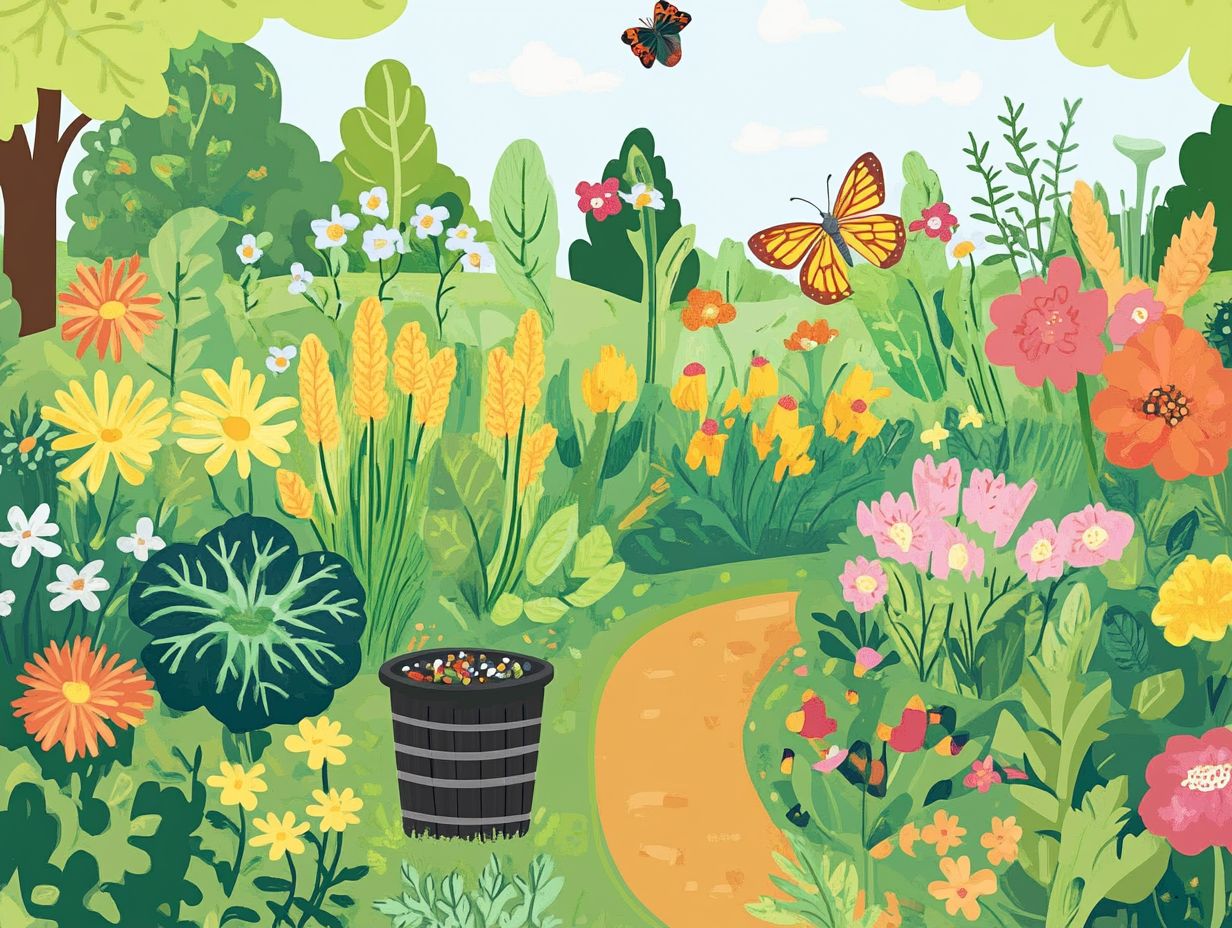
Engaging with nature through ecological gardening invites you to adopt practices that honor and enhance the environment. Focus on organic gardening instead of disrupting it.
By fostering this mutual relationship, you can create spaces that support diverse wildlife, from pollinators like bees and butterflies to beneficial insects and birds. Native plants provide essential habitats, reduce reliance on chemicals, and promote soil health.
Consider the success stories of urban gardens that transform neglected lots into vibrant ecosystems! These examples showcase how thoughtful design and strategic planting can cultivate thriving habitats that benefit both flora and fauna, illustrating the deep connection between responsible gardening and ecological balance.
Using Sustainable Practices
Embracing sustainable practices in ecological gardening means you ll be using composting techniques and organic fertilizers to boost soil health and create regenerative landscapes.
These methods enrich the soil and nurture a balanced ecosystem that supports robust plant growth and resilience against pests. For example, layering kitchen scraps like vegetable peels and coffee grounds with brown materials such as leaves and cardboard can kickstart an efficient composting process.
Opting for organic fertilizers, such as compost tea or seaweed extracts, allows you to provide essential nutrients without resorting to harsh chemicals often found in synthetic options. You can enhance soil biodiversity by incorporating cover crops and practicing crop rotation, which helps prevent soil degradation and fosters beneficial microorganisms.
This comprehensive approach nurtures thriving plants and contributes to a healthier planet.
Creating Biodiverse Gardens
Creating biodiverse gardens is about selecting native plants and designing outdoor spaces that invite wildlife in especially those beneficial insects and pollinators you want to attract!
To achieve this, prioritize species that are indigenous to your local area. These plants thrive in your unique climate and soil conditions while providing essential food sources for the native fauna around you.
Incorporating a variety of plants with different blooming times ensures a continuous supply of nectar for hungry pollinators. Adding elements like water features or brush piles can offer habitats for beneficial creatures, such as birds, amphibians, and other helpful insects.
By designing layered plantings that include flowers, shrubs, and trees, you create a rich ecosystem that encourages diverse forms of wildlife. Steering clear of chemical pesticides and opting for organic gardening practices will further support a flourishing garden environment that nurtures both your plants and the wildlife that visits.
How to Implement Ecological Gardening
Implementing ecological gardening requires a thoughtful, strategic approach. Begin by outlining clear steps to kick off your journey, complemented by a toolkit filled with effective tools and techniques designed for sustainable gardening.
This foundation empowers you to cultivate a thriving, eco-friendly garden that harmonizes with the environment and supports ecological integrity.
Steps to Get Started
Start your journey into ecological gardening by assessing your outdoor space. Understand soil health and choose the right native plants that will thrive in your region.
Once you’ve laid the groundwork, conduct a soil test, a process to check the nutrients in your soil. This knowledge will guide you in amending the soil to support robust plant growth.
After evaluating the soil, selecting native plants should be your next priority. These species are well-suited to your local climate and attract beneficial insects. A diverse array of plants enhances visual appeal and cultivates a resilient ecosystem.
As a new gardener, consider the art of companion planting to boost biodiversity. Certain plant combinations can naturally repel pests and encourage growth. By planning your layout with these principles in mind, you’ll set the stage for a thriving, sustainable garden!
Tools and Techniques for Success
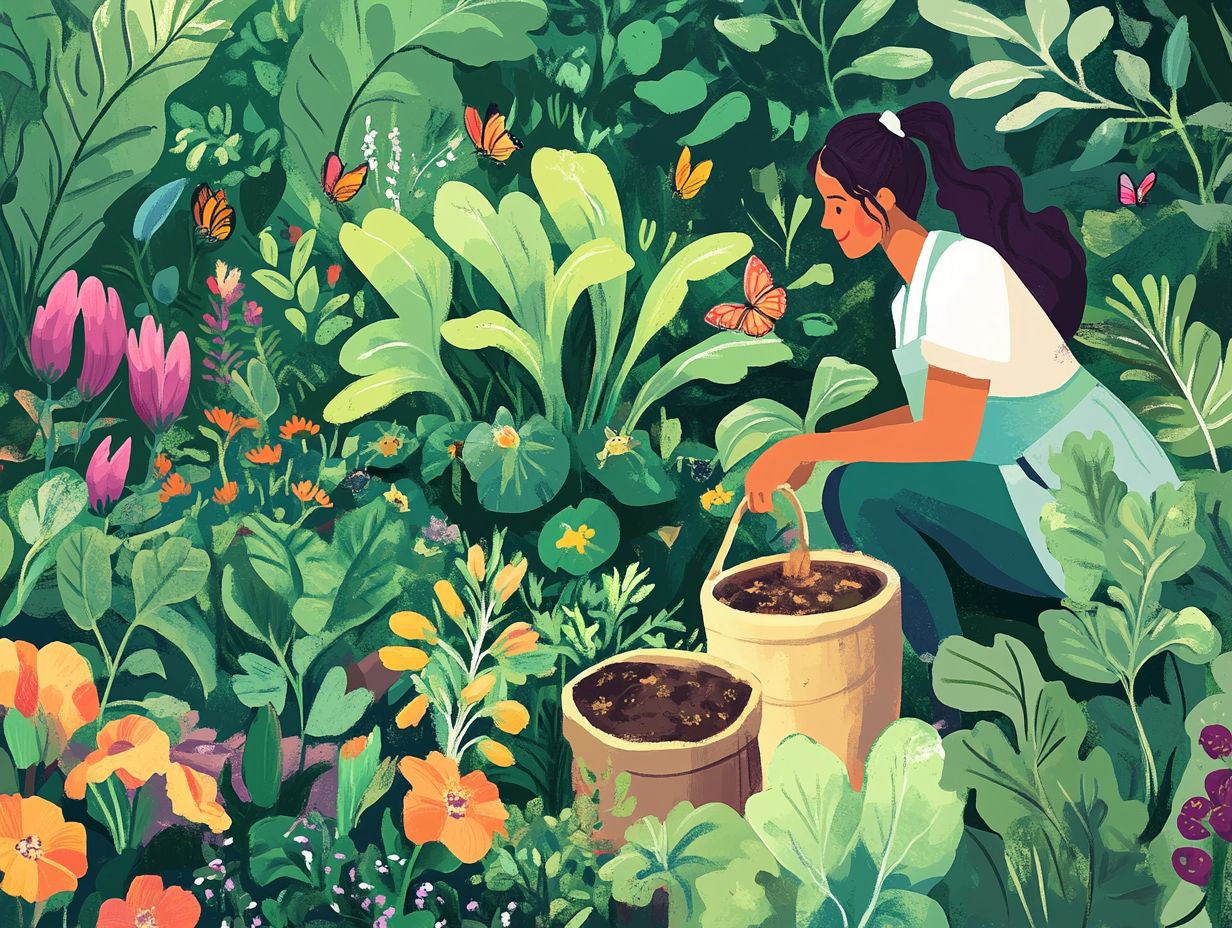
Utilizing the right tools and techniques is essential for success in ecological gardening. This includes crafting compost piles and selecting sustainable gardening instruments that reduce your carbon footprint.
These tools boost productivity significantly while promoting environmental sustainability. You might discover that certain hand tools, like ergonomically designed trowels and cultivators, make planting and weeding a breeze. Advanced tools, such as soil testers, provide valuable insights into nutrient levels.
Employing techniques like mulching and crop rotation the practice of alternating different crops in the same area to improve soil health not only boosts soil health but also supports natural pest control. By integrating these tools and methods, you can cultivate a thriving garden ecosystem that benefits both your plants and the surrounding environment.
Common Myths and Misconceptions
Common myths and misconceptions about ecological gardening can easily dissuade you from adopting this rewarding practice. These misunderstandings often cloud the true principles and benefits that ecological gardening offers, preventing you from fully appreciating its value.
Debunking False Beliefs
Debunking misconceptions about ecological gardening is crucial for fostering acceptance, particularly concerning its effects on wildlife and the merits of organic practices.
You might think that such gardens require extensive maintenance, but the truth is that once established, they often require less care than traditional lawns or plantings. For instance, native plants in your area typically need less watering and show greater resistance to local pests, creating a sustainable garden ecosystem.
Some may believe that ecological gardens don’t attract diverse wildlife, yet evidence suggests otherwise. These spaces can actually enhance biodiversity by providing essential habitats. Successful examples, like community gardens featuring native plants, have led to a surge in pollinator populations, showcasing how effectively organic practices can be integrated while enriching local ecosystems.
Frequently Asked Questions
What are the principles of ecological gardening?
The principles of ecological gardening are guidelines that promote sustainable and environmentally-friendly practices. Understanding the principles of permaculture design can enhance these practices, which include using native plants, conserving water, promoting biodiversity, minimizing chemical use, and creating a healthy ecosystem.
Why is using native plants important in ecological gardening?
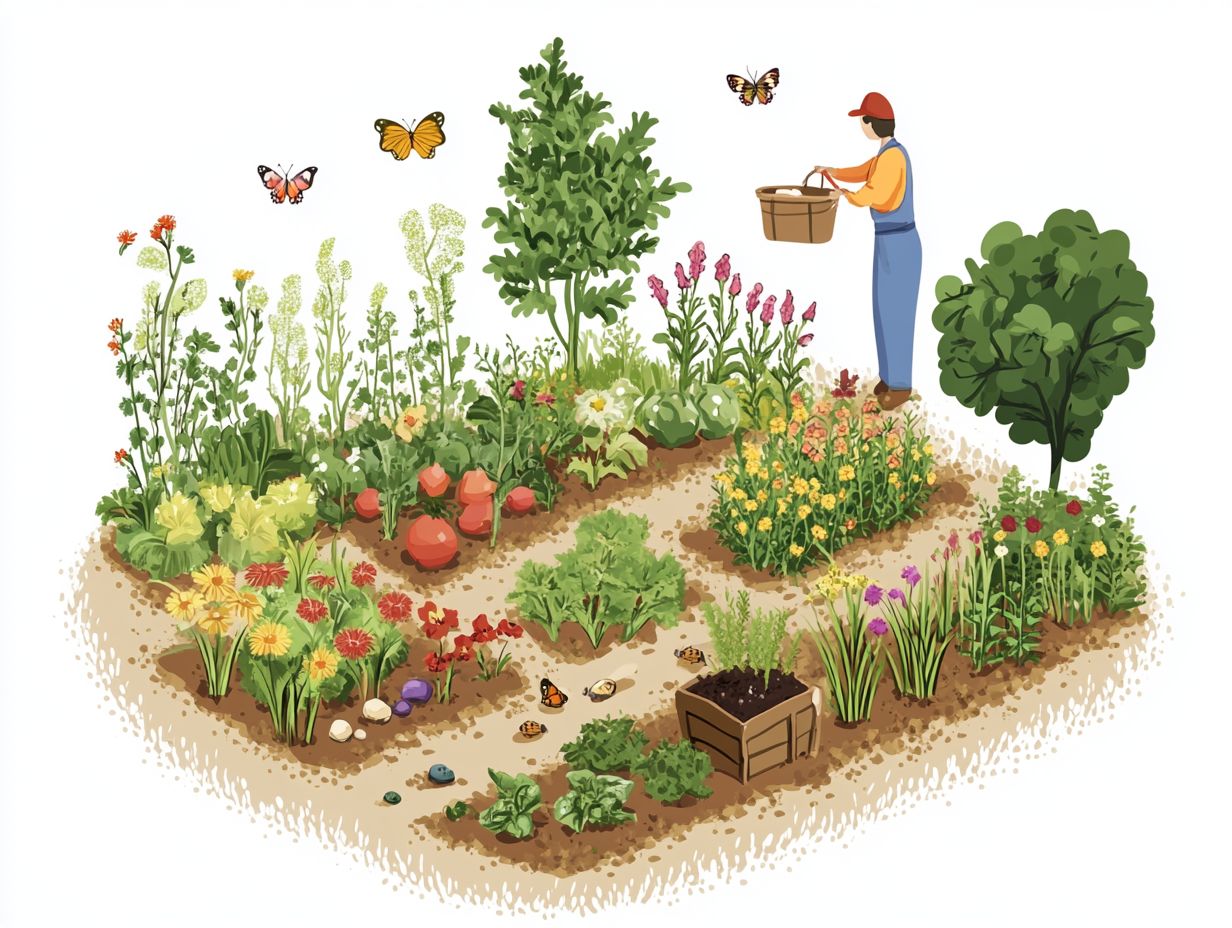
Using native plants in ecological gardening helps maintain the balance of the local ecosystem. Native plants are adapted to the local climate and require less water and maintenance, making them more sustainable and beneficial for the environment.
How does ecological gardening promote biodiversity?
Ecological gardening encourages planting a variety of plants, including those that attract pollinators and beneficial insects. This helps create a diverse ecosystem, which is crucial for the health of the garden and the surrounding environment.
Ready to start your ecological gardening adventure? Join a local gardening community or begin planning your sustainable garden today!
What are some ways to conserve water in environmentally friendly gardening?
Conserving water can be easy. Use rain barrels, drip irrigation systems, and mulch.
Choose plants that need less water and group them by their water needs. This approach helps use water more efficiently.
Why is minimizing chemical use important in environmentally friendly gardening?
Pesticides and fertilizers can harm helpful insects and pollute our water. Ecological gardening encourages natural pest control methods, which means using fewer harmful chemicals.
How does environmentally friendly gardening contribute to a healthy ecosystem?
This type of gardening creates a sustainable environment that supports wildlife.
By following these principles, we can restore a healthy ecosystem essential for all living beings.

